Listen:
Check out all episodes on the My Favorite Mistake main page.
My guest for Episode #320 of the My Favorite Mistake podcast is Damon Lembi, CEO of Learnit, a live learning and development platform that has helped upskill over 2 million professionals. A former college baseball player and now a two-time bestselling author, Damon shares the story of how youthful ambition and overconfidence led him to push Learnit into a rapid, unsustainable expansion during the dot-com boom. Despite his father’s cautious advice, Damon got his way—and then faced the harsh reality of a collapsing market and near bankruptcy.
In our conversation, Damon reflects on the hard-earned lessons from that pivotal mistake, including the dangers of comparing yourself to others, the importance of thinking through worst-case scenarios (what he now calls “purposeful awfulizing”), and the humility required to be a “Learn It All” leader. His resilience and willingness to grow through adversity helped him guide Learnit not only through the early 2000s tech crash, but also through the 2008 recession and beyond.
“If you’re always right, you’re not listening hard enough.”
Damon shares how his background as a competitive athlete shaped his mindset around failure, feedback, and agility—traits that now inform how he builds his team and company culture. We also talk about his podcast, The Learn It All Podcast, where he continues learning from top authors, leaders, and changemakers. Damon’s story is a powerful reminder that mistakes can be an expensive—but invaluable—education.
“Make new mistakes, learn from them, and move forward.”
Questions and Topics:
- What’s your favorite mistake?
- How did you go from playing baseball to becoming CEO of Learnit?
- What lessons did you take from your baseball career into business?
- Did you ever regret turning down the chance to play minor league baseball?
- Was anyone cautioning you against overexpanding Learnit?
- What did you learn from that experience as a young CEO?
- How did you apply those lessons during the 2008 recession?
- How has your leadership style evolved since then?
- What does “being a Learn It All” mean to you?
- What kind of people do you look to hire and why?
- How do you balance vulnerability and confidence as a leader?
- What did you learn about receiving feedback from your time in sports?
- How do you avoid letting one failure affect your next decision or meeting?
- What’s the difference between failure and a mistake?
- Can you share more about your Learn It All podcast and what you’ve gained from it?
Scroll down to find:
- Video version of the episode
- How to subscribe
- Quotes
- Full transcript
Find Damon on social media:
Video of the Episode:
Quotes:
Click on an image for a larger view
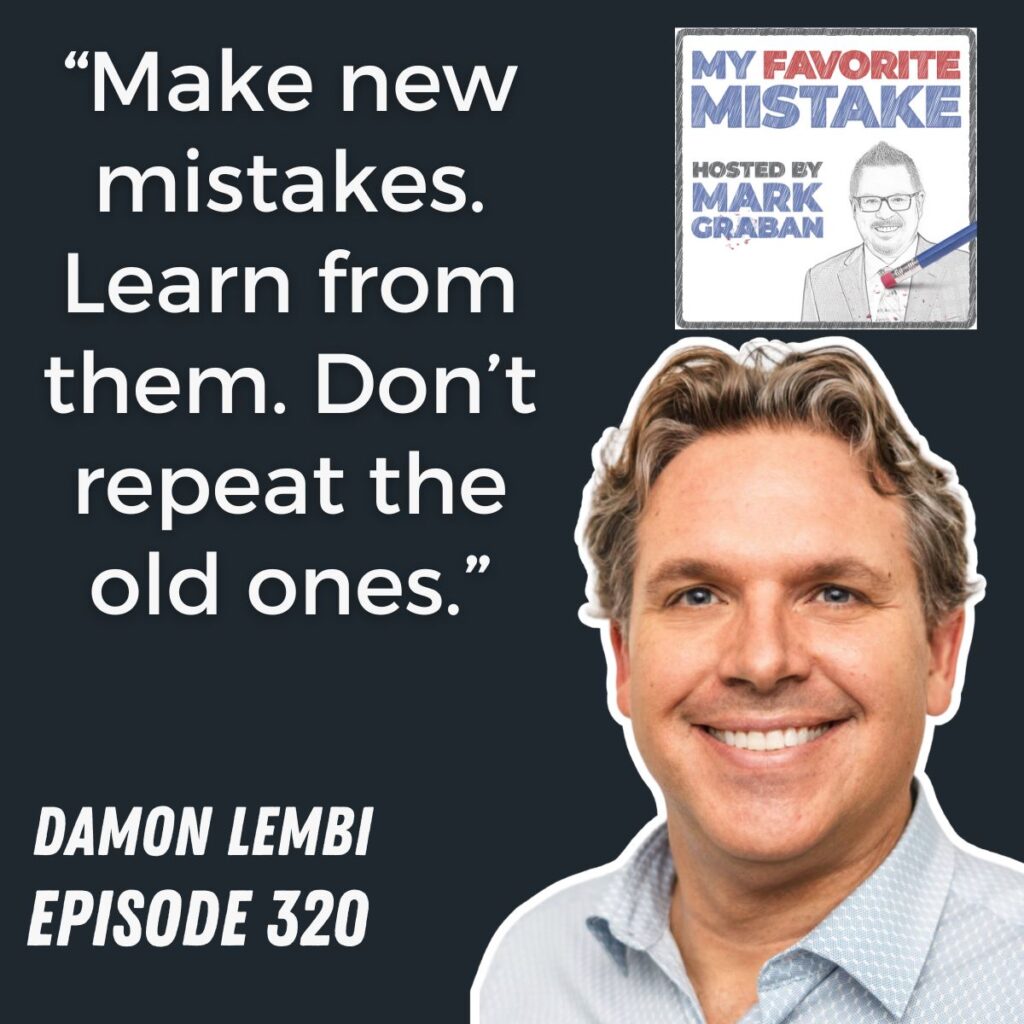
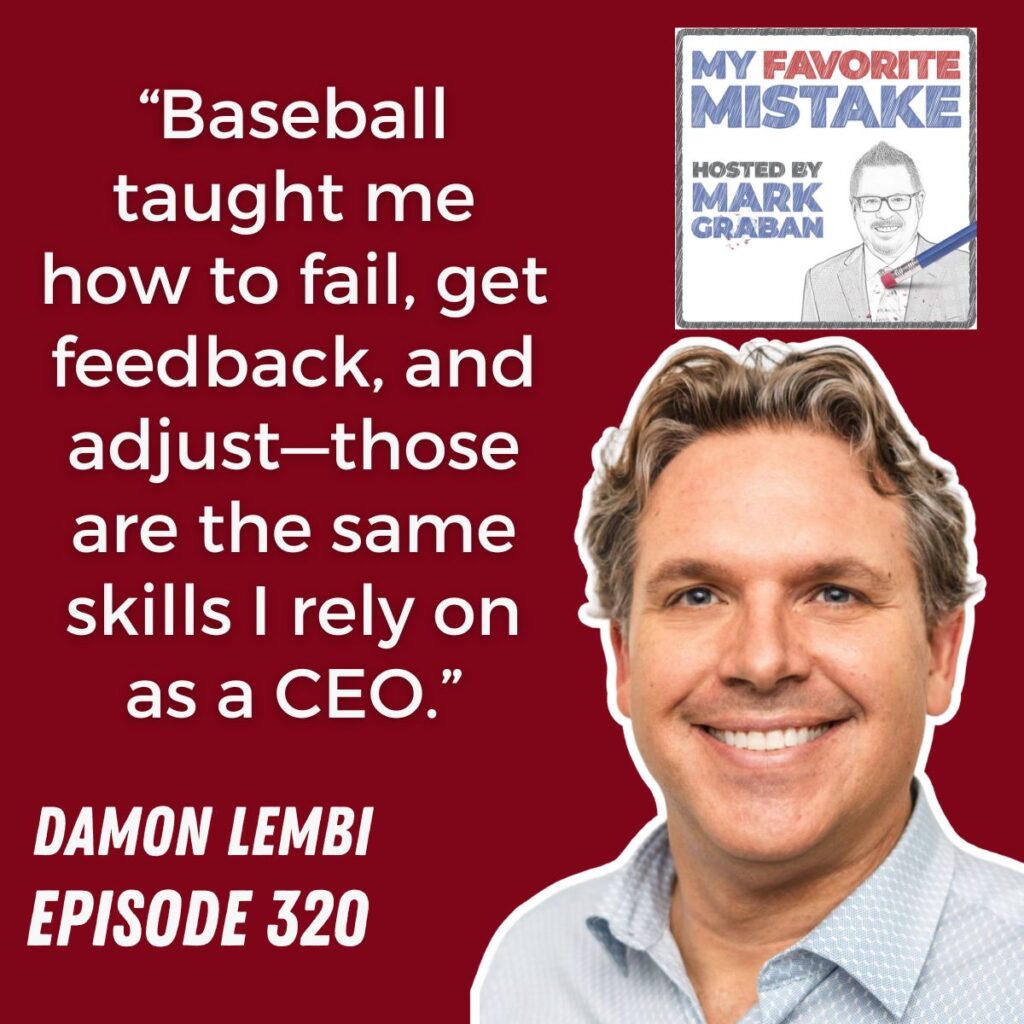
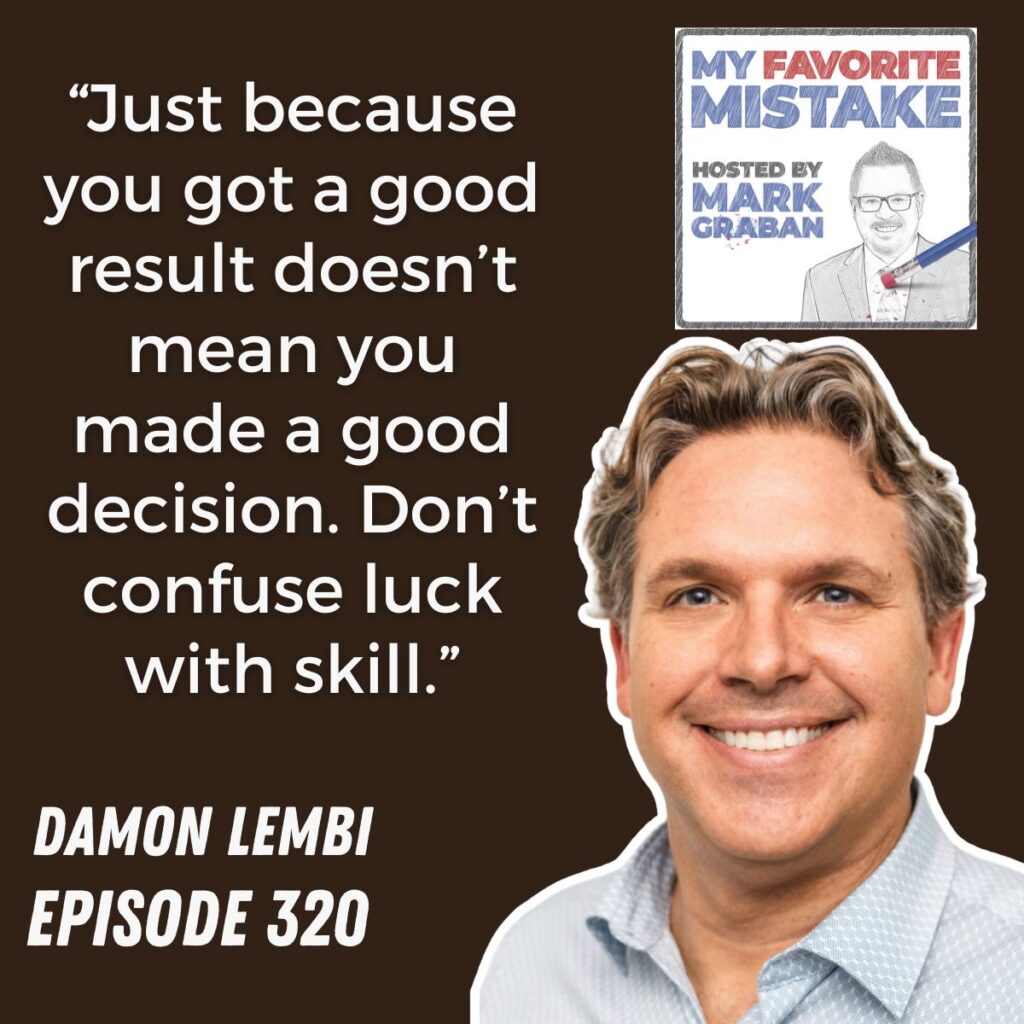
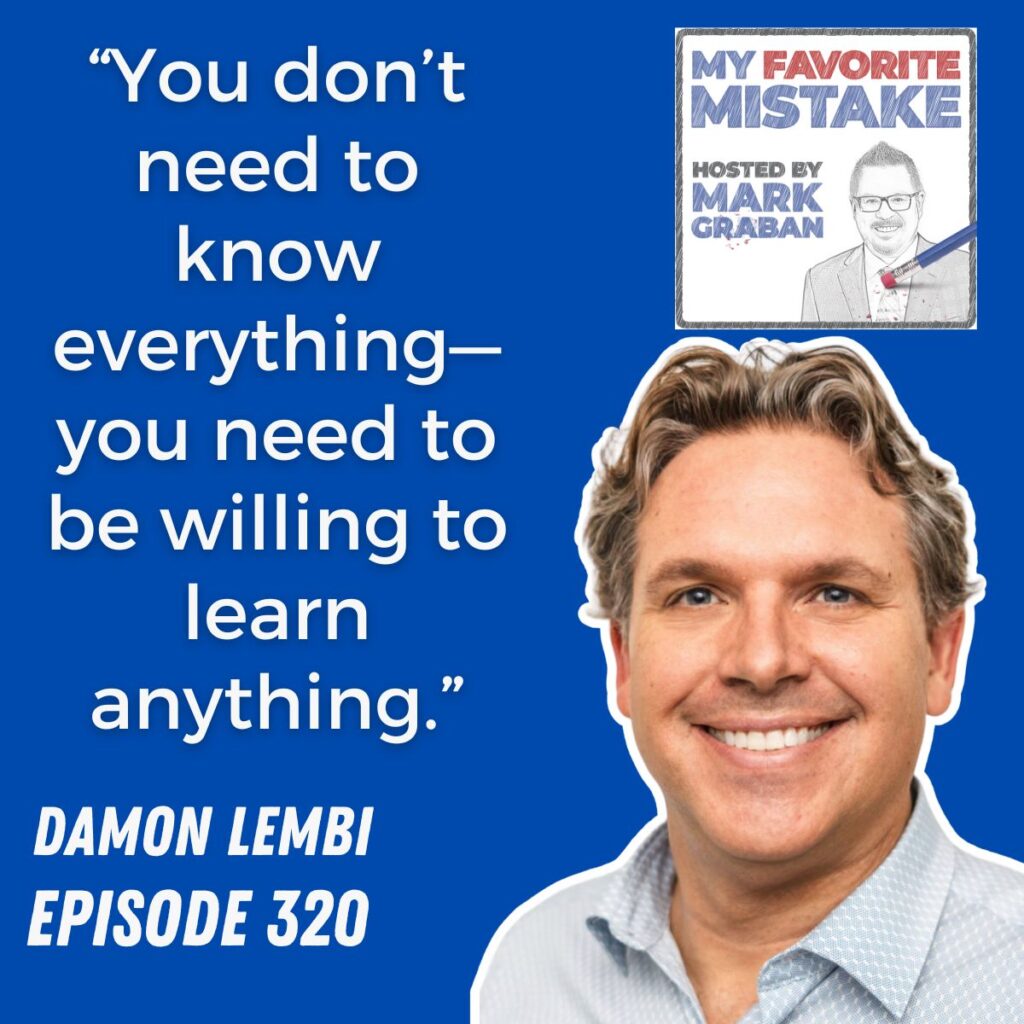
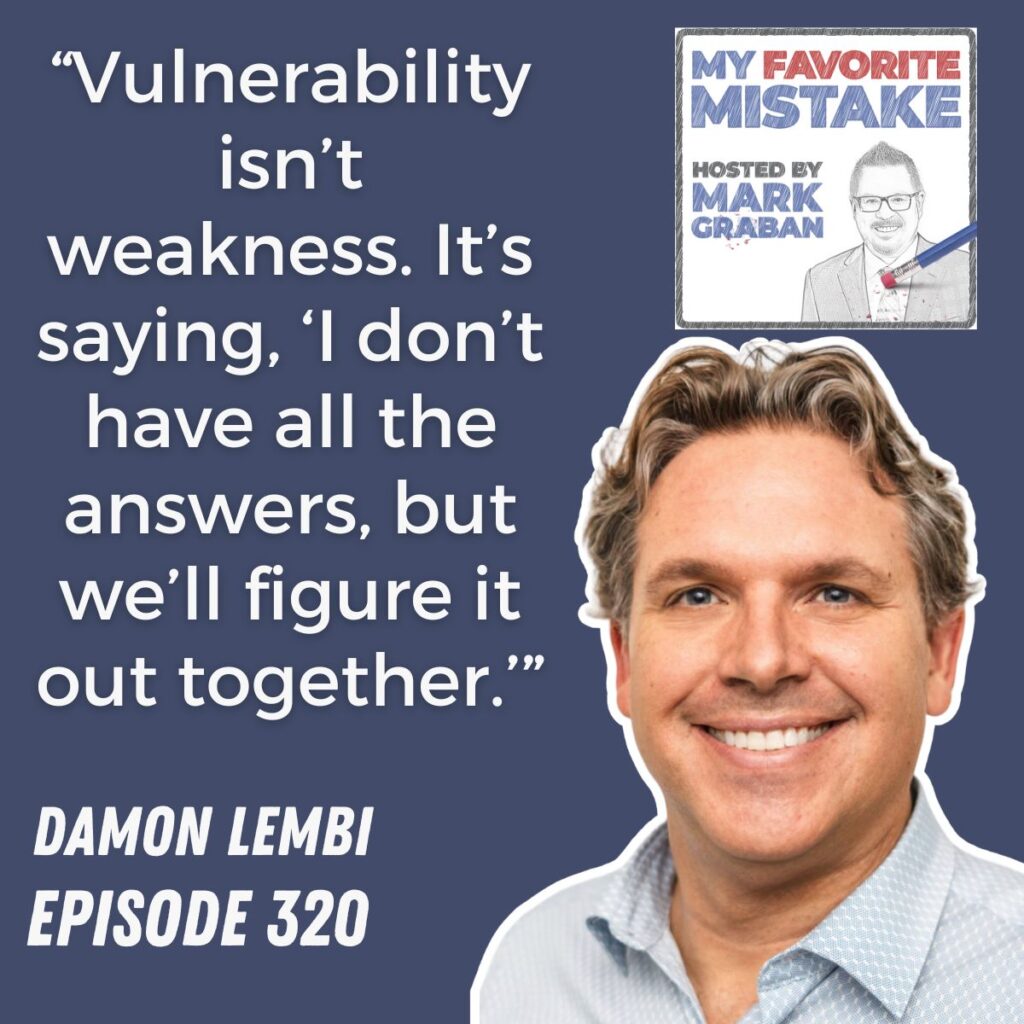
Subscribe, Follow, Support, Rate, and Review!
Please follow, rate, and review via Apple Podcasts, Podchaser, or your favorite app—that helps others find this content, and you'll be sure to get future episodes as they are released.
Don't miss an episode! You can sign up to receive new episodes via email.
This podcast is part of the Lean Communicators network.

Other Ways to Subscribe or Follow — Apps & Email
Automated Transcript (May Contain Mistakes)
Mark Graban:
Hi, welcome to My Favorite Mistake. I'm your host, Mark Graban. Our guest today is Damon Lembi. He’s a two-time bestselling author, the host of the Learn It All podcast, and the CEO of Learnit, a live learning platform that has helped upskill over 2 million people.
Drawing on his prior baseball career, Damon brings an athlete’s perspective to leadership, which I always enjoy hearing about. Through his journey, he’s gained invaluable insights into what helps organizations grow, how great leaders learn, and why Learn It All companies outpace their competitors every time.
Damon, I almost made a mistake there—caught myself. Damon, welcome to the show.
Damon Lembi:
How are you, Mark? It's great to be here. Thanks for having me, buddy.
Mark Graban:
Yeah, it's great to have you here. And when we think of Learn It All—just real quickly before we get into the first question—I love that phrase, as opposed to being a Know It All leader or company, right?
Damon Lembi:
Exactly right. A Know It All is someone who comes into the game thinking they have it all figured out. They have all the answers and aren’t open to what anyone else has to say.
Versus a Learn It All, who comes in open-minded and curious. Kind of like what we were talking about before we came on air—whether it's AI or how things are evolving, you’re just trying to find new ways and learn from different people on how to get better.
Mark Graban:
Yeah, so I think we'll come back and talk about that theme because I think it helps us succeed. It helps us either prevent certain mistakes—because we're not too hell-bent on moving forward with our first idea—or we’re open to learning or hearing from others on our team or otherwise. So we’ll come back to that, Damon, but let's go into what’s normally our first question.
I know you have a story for us today. What’s your favorite mistake?
Damon Lembi:
Well, I've got one that really stands out. Like pretty much all your guests, I’m sure they come on and say they’ve made a thousand mistakes. Same with me. But the one that really stands out as my favorite mistake happened after Learnit opened in 1995.
I started off as a receptionist, and fast-forward to late 1998 or early 1999, I became the CEO. I was in San Francisco, and it was the beginning of the dot-com boom. I was relatively new in the workforce. My only other job before being a receptionist was being a baseball player.
So I took over as CEO, and things were going really well. All my buddies were doing really well—making a bunch of money in telecom or any kind of dot-com or internet startup. And I really pushed my dad to expand. I wanted to open more locations across the country, even more in San Francisco.
Learnit was a family-owned business, and my dad said, “Hey, look, bigger is not always better. You’re actually making money. Don’t worry about these smoke-and-mirror companies other people are chasing.” But I was stubborn, and I got my way.
We overexpanded. And then you know what happened after that. It wasn’t just 9/11 in 2001—it was already happening before that. The market crashed. The bubble burst. And if it wasn’t for my family’s support, Learnit wouldn’t be here today. We would’ve been completely out of business.
Mark Graban:
I appreciate you sharing that story, Damon. There’s a lot we can unpack there. That wrinkle of it being a family business—tell us more about how you got to that point. You were playing baseball in college, then what?
Damon Lembi:
Yeah, so my whole life, I wanted to be a baseball player. I went all in on that. I got drafted out of high school by the Atlanta Braves, but I decided to go to Pepperdine. I had a full scholarship. That decision became one of my first big leadership lessons.
Our coach, Andy Lopez—he’s now in the College Baseball Hall of Fame—he told us, “You’re going to come in and we’re going to win the College World Series.” That was a moonshot goal for a school with only 2,500 students, going up against Arizona State, LSU, all the big programs. But I bought into it.
I ended up getting hurt. I left. And the year I left… they won the College World Series. So moonshot goals can come true.
I transferred to Arizona State, played during their glory days, and even hit a home run in the College World Series. I was getting ready to be drafted again—for the third time, which is pretty common—but it didn’t happen. I didn’t get drafted.
So there I was, 22 years old. I didn’t know what I was going to do next. I’d never had a job outside of baseball. And honestly, I wasn’t sure my skills were even transferable.
Damon Lembi:
I was fortunate. I came from a family that had a big real estate company, a savings and loan, and even a Chinese restaurant. But honestly, I was too intimidated to jump into the real estate business.
At the time, my dad was starting a computer training company called Learnit. He was doing what great entrepreneurs do—solving his own problem. This was the early days of the internet, and he wanted to digitize the family’s real estate portfolio. He went to a computer class and thought it was terrible. He said, “There’s got to be a better way.” So he hired the CFO from our savings and loan, and that’s how Learnit started.
I started at the front desk because I wanted to prove I could add value. I didn’t want anyone thinking I got handed a job just because I was Walt Lembi’s son. So I was a receptionist. I learned how to use computers. I taught classes. I did sales. I did a little bit of everything.
About three and a half, four years in, the CFO my dad had hired wasn’t working out. My dad and the board were looking for someone new. I threw my hat in the ring. I said, “I’ve taught classes. I’ve helped with IT. I closed our biggest deal at the time—Gap Corporate. Give me a shot.”
They gave me a shot. I became CEO. And within a year, I thought I was a genius. I remember thinking, “All you need is fax paper and a good pitch, and you’ve got a business.” I was 26 or 27. That’s what led to the story I told earlier—me pushing for rapid expansion.
Mark Graban:
Yeah, and I think during tech booms, we often hear the phrase, “We were just order takers.” If you had a decent product and answered the phone, business just came to you. It didn’t necessarily test whether your sales strategy or growth approach was sustainable.
I’ve also seen people who did really well at big-name companies struggle when they moved to startups. Like, if nobody’s heard of the company, you can’t just take orders—you have to grind. So it’s interesting to hear how that parallel played out for you.
Damon Lembi:
Yeah, with Gap, for example, when Learnit was just starting out, nobody knew who we were. We were competing against companies owned by IBM, like Catapult and Productivity Point. Huge players.
There’s that old saying—“Nobody ever got fired for buying from IBM.” If you buy from a small company and it doesn’t go well, you’re sticking your neck out. Winning that deal at Gap put us on the map. Once we could say, “We work with Gap,” and they served as a reference, that opened the floodgates.
So that was a big deal. Now, in terms of going from baseball to business—I like to call it an athletic education. I didn’t realize it at the time, but I learned discipline, resilience, teamwork, how to take feedback—all things that translated to my business career.
And I’ll be honest: I wasn’t a great student. I never really paid attention in school. It wasn’t until I joined Learnit that I really fell in love with learning and development.
Mark Graban:
Did you have any regret about not pursuing the minor league baseball path?
Damon Lembi:
That’s a great question—and I’d say probably. I’m happy with the decision I made, but I do think about it.
I remember it like it was yesterday: I was 17, sitting with my parents and a famous scout from the Atlanta Braves named Bill Sorrento. He gave me a written contract for about $100,000—this was 1990, so that was a lot of money. Still is.
I turned it down. Part of it was being intimidated about jumping into the minors at 17. I would’ve played with Chipper Jones in rookie ball. But my parents were great—they said, “This is your life, your decision. We’ll support you either way.”
I went the college route because of Coach Andy Lopez at Pepperdine and because I felt like I needed more maturity. But I always thought I’d get another shot. I had a good college career—All-League, second in hitting my junior year at Arizona State—and I thought for sure I’d get drafted again. But I didn’t.
So yeah, part of me regrets never getting a single at-bat in the minor leagues. That still kind of drives me nuts. But I also believe everything happens for a reason.
Making it to the big leagues is so tough. I’ve got friends who got stuck in the minors and started their careers later, and I’ve got friends who made it to the majors. So while I reflect on that decision sometimes, I’m not bitter. I don’t lose sleep over it. Honestly, it feels like a different life now when someone brings it up.
Mark Graban:
And I didn’t hear you framing that as a huge mistake—it’s more like a big, pivotal moment. And yeah, to be making that kind of decision at 17… that’s heavy. I mean, the biggest decision I had to make was which college to attend. That’s a different kind of pressure.
Also—side note—you were kind to say that being in the marching band was cool.
Damon Lembi:
It is cool! I’ve never had a conversation with someone who was in the marching band.
Mark Graban:
Well, I played drums, which I think gave me a little extra cool factor. My wife—who went to Arizona State, by the way—wasn’t in the Sun Devil band or hanging out with marching band folks.
Damon Lembi:
Well hey, if you were able to marry someone from Arizona State, you’ve got to have some cool stuff going for you!
Mark Graban:
Let’s go back to your story at Learnit. When you were making the decision to go after that aggressive growth, was it one of those things where everyone around you thought it was a good move and it just didn’t pan out? Or was there anyone playing the “Doubting Thomas,” warning you about growing too fast?
Damon Lembi:
We talked earlier about being a Learn It All versus a Know It All—well, at the time, I was a Know It All. I was stubborn. I was cocky. I thought, “This is what we’re going to do,” and I didn’t listen.
My dad didn’t want to do it at all. He told me, “When I expanded our real estate business and our savings and loan, it was hard to maintain the culture. It’s hard to manage when you’re spread too thin. You're doing well now—take it slowly.”
But he was kind enough to let me go for it. He said, “This is your business now. I’ll support your decision.” And so we did it. We expanded too quickly.
What I learned from that was huge. First off: humility. I realized I didn’t have all the answers. And I needed to listen to the people around me, especially those with more experience.
Second lesson: I hadn’t thought through the worst-case scenario. I call it purposeful awfulizing now. Back then, I was just overly positive. I kept forecasting all the upside: “We’ll make this much revenue, we’ll grow like crazy.” But I didn’t stop to ask, “What if things don’t go well? Will we still have enough cash for payroll? Can we cover expenses?”
If I had done that—even with a moderate worst-case scenario—I probably would have made a much different decision. Maybe we would have expanded more slowly. Maybe we would’ve focused on strengthening what we had.
Mark Graban:
That's such a key lesson. And I think it’s something leaders can really take to heart. You weren’t just making projections—you were comparing yourself to others, too, right?
Damon Lembi:
Totally. I was comparing myself to my friends. They were driving fancy new BMWs. They were millionaires on paper with all their stock options. And here I was at Learnit—this small family business.
We’d go out to the bars in the city, and everyone worked at some flashy startup. That’s where I really pushed to expand. And my dad would just say, “Look, those are smoke and mirrors. You’ve got a product. You’re actually making money. Be smart about it.”
So the third lesson? Stop comparing. Be happy for your friends, sure—but don’t compare your journey to theirs.
And lastly, I learned how resilient I really was. I knew I was resilient in baseball—I’d strike out and bounce back. But I didn’t know if I had that same grit in the business world.
Turns out, I did. It took about three years to recover. There were some really tough moments. I had to call my dad and my grandfather—who was an old-school San Francisco legend—and ask for help.
Mark Graban:
That must’ve been tough.
Damon Lembi:
It was. I remember calling my grandpa and saying, “Hey Gramps, how’s it going?” And then: “Can I borrow $20,000 for payroll this week?” He always said yes—but not without a few choice words I probably shouldn’t repeat here.
Mark Graban:
It’s hard to ask family for something like that. But you did it. You didn’t give up.
Damon Lembi:
Right. And that’s when my dad said something I’ll never forget. He told me, “You just got the most expensive MBA I’ve ever seen—a real-world MBA.” And it’s true. I learned the hard way.
And years later, when the 2008 recession hit, we made it through—without family backing—because I didn’t repeat the same mistakes. We were proactive. We were disciplined.
Mark Graban:
Beyond the company’s survival and recovery, it’s really cool to hear that the CEO of a company called Learnit is now truly a Learn It All. How would you say your leadership style has changed in recent years—especially with that humility, that shift away from “I’ve got all the answers”?
Damon Lembi:
I’d say it’s an ongoing journey. You’re always learning, growing, and evolving.
But honestly, it took me until maybe three years ago—around COVID—to really improve at delegating and giving up control. I had always been good at surrounding myself with great talent, but I still wanted to be involved in all the big decisions. I was the bottleneck.
And I finally realized: I have people on my team who are better at certain things than I am. Logistically, operationally, marketing—some of them are just stronger in those areas. If I’m going to hire people with great capabilities, I need to trust them and let them do their thing.
If you surround yourself with people who bring diverse opinions and strong skills, you've got to tap into that. You've got to give them autonomy.
Mark Graban:
That’s such a valuable mindset shift. And how do you approach building your team? You mentioned hiring great people—what do you look for?
Damon Lembi:
I don't prioritize experience, honestly. I look for people with great attitude and aptitude—people who want to learn, grow, and aren’t afraid to make mistakes.
I tell candidates during interviews, “You’re probably meeting with me as your third or fourth step in this process. I don’t want someone who’ll just follow a rigid path with blinders on. I want you to try things. Take risks.”
I always say: There’s nothing you can do—short of something illegal or putting your teammates at risk—that’s going to break Learnit. Just don’t make the same mistake twice. Make new mistakes, learn from them, and keep going.
Mark Graban:
That really ties back to the spirit of this show—making mistakes, learning from them, and turning them into something positive.
Damon Lembi:
Exactly. One thing I’ve always believed in is being vulnerable but confident. I try to be transparent with my team.
In our quarterly meetings, if we’ve had a bad quarter, I’ll share the numbers. I’ll be honest about it. But I’ll also say, “We’re going to figure this out. We’ll work together, and we’ll succeed.”
I think leaders need to show vulnerability—but not in a way where you’re falling apart. People don’t want to follow someone who’s crying in a corner. They want to follow someone who’s honest and steady, who says, “Yeah, this is hard, but we’ve got this.”
Mark Graban:
I really appreciate that framing—vulnerable but confident. I sometimes call it confident humility. There’s real strength in being able to say, “I might be wrong, let’s test it. Let’s learn more.” That’s not weakness—it’s a leader who’s open to growth.
Damon Lembi:
Yeah, and vulnerability can’t be all about you. If you're constantly saying sorry or breaking down, you’re putting yourself at the center of the story again. True vulnerability means saying, “I don’t have all the answers. What do you think?” That brings others in. That creates a culture of collaboration.
And that’s what people want in a leader. Someone who listens. Someone who says, “Let’s figure this out together.”
Mark Graban:
There’s so much to take away there. I think another theme you’ve brought up is balance—especially when it comes to thinking through the worst-case scenario. You talked about purposeful awfulizing. That phrase really stuck with me.
Sometimes, the worst-case scenario isn’t as bad as we fear. But other times, it might be something critical—like, “This launch could bankrupt us.” It’s worth thinking through those scenarios.
Personally, I probably lean too far in the other direction. I’m not overly confident, but I can fall into the trap of awfulizing everything. I’m trying to find that balance.
Damon Lembi:
That’s really important. I had a guest on my podcast—Derek Sloan, a mental therapist—who said we have something like 60,000 to 80,000 thoughts per day, and 80% of them are negative. Most of those fears never come true. And when they do, they’re often not as bad as we imagined.
You don’t want to be overly optimistic, but you can’t be consumed by negativity either. Finding that middle ground is key. And just being aware of how you think, like you are—that’s a great first step.
Mark Graban:
The other thing I loved that you said was “vulnerable but confident.” It’s easy for people to misunderstand vulnerability. It doesn’t mean weakness. It means being open enough to say, “I could be wrong,” or “I want your input.” That takes strength.
Damon Lembi:
Absolutely. And that kind of behavior creates safety for others to do the same. If I say, “Hey, I don’t know,” then someone else in the room might say, “Yeah, me neither—but let’s figure it out.” That’s how you build a strong team.
Leadership is about modeling the behavior you want to see in others.
Mark Graban:
Let’s go back to baseball for a minute. One thing I find fascinating is how often failure happens in that sport. Even Hall of Famers get out 70% of the time. Do you think that experience helped shape your mindset when it comes to handling failure?
Damon Lembi:
Definitely. All sports have failure, but baseball is especially relentless. You strike out, you get back in the box. You hit a line drive, but someone catches it. That’s still an “out.”
Baseball taught me resilience, and it also taught me learning agility. The ability to receive feedback, adjust, and try again.
And that’s huge in business. Today, when people ask me what the most important skill is for professionals, I say: learning agility. The ability to learn, unlearn, and relearn. Right next to that? The ability to receive feedback. Not just give it—but receive it.
If you take feedback well, people will be more likely to give it to you again. And feedback is the fuel for improvement.
Mark Graban:
I love that connection. There’s also a distinction between mistakes and failures. They’re not always the same. You can make a great decision and still get a bad outcome—or make a poor decision and get lucky.
Damon Lembi:
Exactly. That’s something Annie Duke talks about in her book Thinking in Bets. She gives the example of drunk driving. You might get home safe—that’s a good result—but it was still a terrible decision.
Same goes in business. Let’s say you close a deal. But if you skipped all the right steps, didn’t qualify the customer, didn’t follow your sales process—well, maybe you got lucky, but that’s not sustainable.
So don’t confuse good outcomes with good decisions.
Mark Graban:
Right. I was watching some old baseball highlights recently—Cecil Fielder, Detroit Tigers. He clearly got fooled on a pitch, way out on his front foot… but he still hit it into the upper deck. That’s a result, but the process wasn’t ideal.
Damon Lembi:
That’s a perfect example. He adjusted mid-swing. That’s what great hitters do. But it doesn’t mean you want to swing like that every time.
Mark Graban:
So even when you make a mistake—swinging too early, or taking a bad approach—it doesn’t mean you won’t get a good outcome. But you might still have something to learn, even from a “success.”
Damon Lembi:
Right. And that’s where you’ve got to be careful about resulting. Just because something turned out well doesn’t mean you made a good decision.
And the reverse is true too. You might do everything right, follow the process, and still get a bad result. That doesn’t mean you change the whole system.
Mark Graban:
I’ve seen that in healthcare. A team might skip the safety checklist before surgery, and nothing bad happens… so they start thinking, “Maybe we don’t need this step.” It’s like the normalization of deviance. And then one day, it catches up to you.
Damon Lembi:
Exactly. And I love The Checklist Manifesto for that reason. Doctors would skip steps or think, “This is too simple,” and it would lead to really serious consequences. It’s a great reminder that discipline matters, even in the basics.
Mark Graban:
As we start to wrap up… I just want to acknowledge how much I appreciate what you shared—your openness, your humility. And I think it’s amazing that after all this time, you’re still learning, still growing, and still leading with curiosity.
Tell us a little more about your podcast—The Learn It All Podcast. What’s that experience been like for you?
Damon Lembi:
Thanks, Mark. I started it about a year and a half ago, and I absolutely love it. I bring on authors, leaders, former athletes—it’s all about learning from people with experience and wisdom.
I’ve had folks like Gary Ridge, Stephen M.R. Covey, Doug Conant, Dr. Jessica Kriegel. It’s been an incredible opportunity for me as a lifelong learner. I read a lot, but getting to talk to these people and ask questions? That’s next-level learning.
And hopefully, the audience picks up a few things they can apply right away, too.
Mark Graban:
Podcasting is such a great way to learn and connect. And Damon, I’m really glad we had the chance to do this today. Thanks so much for being a guest on My Favorite Mistake.
Damon Lembi:
Thanks, Mark. I had a great time. I really appreciate the conversation.

